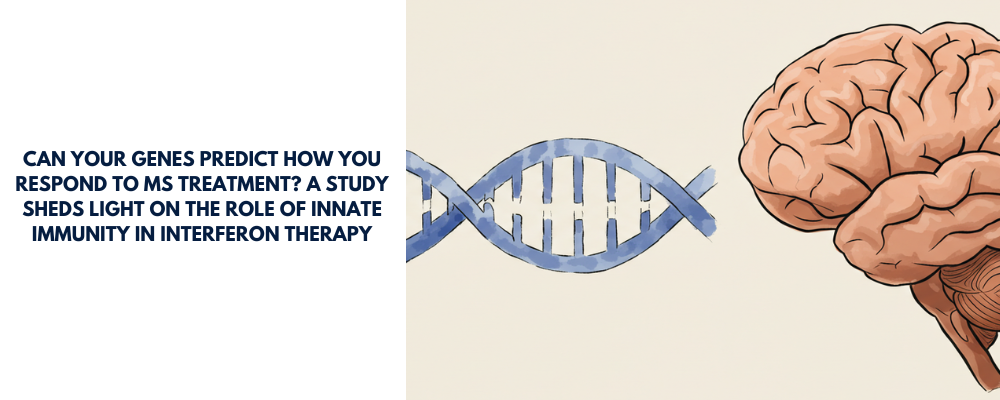
Multiple sclerosis (MS) is a complex immune-mediated disease. Affecting nearly 2.8 million people worldwide, MS is a chronic autoimmune condition where the body’s own immune system attacks the central nervous system. While there is no cure yet, medications like interferon-beta (IFN-β) have become frontline defenses—particularly for the relapsing-remitting form of MS (RRMS), which accounts for about 85% of cases at diagnosis.
But here’s the problem: not everyone responds the same way to IFN-β. Some patients see a substantial drop in disease activity, while others experience relapses or even develop neutralizing antibodies (NAbs) that block the drug from working. So, what gives?
That’s exactly what a team of Danish researchers, led by Christian Enevold, set out to investigate. Their hypothesis: differences in our innate immune genes—specifically in pattern recognition receptors (PRRs) like Toll-like receptors (TLRs)—might explain who responds well to IFN-β and who doesn’t.
What They Did
The team analyzed 567 Danish RRMS patients undergoing IFN-β therapy. These patients were closely monitored over a two-year period. The researchers looked at 42 genetic variations (single nucleotide polymorphisms or SNPs) across several PRRs, including TLRs 1-10, NOD1/2, and RIG-I-like receptors (RIG-I and IFIH1). Their goal: see if any of these tiny genetic differences were linked to:
Time to first relapse
Disease progression
IFN-β treatment response
Development of neutralizing antibodies
They even broke it down by gender, given that MS often behaves differently in males vs. females.
A Male-Specific Genetic Clue
The standout finding was a genetic variant in TLR6 (rs5743810), which significantly affected whether males developed neutralizing antibodies after 24 months of therapy.
Men with the T-variant of this SNP were less likely to develop NAbs compared to those with the C-variant.
This is important because NAbs can completely cancel out the benefits of IFN-β therapy. So identifying a patient’s TLR6 genotype before starting treatment might one day help doctors personalize therapy—especially for male patients.
Interestingly, this gender-specific association held up even after correcting for multiple statistical comparisons, giving it more scientific weight.
Other Findings (That Didn't Quite Make the Cut)
The researchers did observe some potential associations between other SNPs and treatment outcomes. For example:
TLR2 and NOD2 variants affected time to relapse
TLR7 and NOD1 were linked to disease progression
TLR4, TLR9, and NOD2 showed differences in NAb development
However, these findings didn’t survive statistical correction, which means they could have been due to chance. Still, they point to interesting directions for future research.
Why This Matters
This study highlights a powerful idea in pharmacogenomics—the study of how our genes affect our response to drugs. While IFN-β remains a mainstay treatment for RRMS, its effectiveness varies dramatically from person to person. Understanding how innate immune receptors like TLRs influence this response could help tailor treatments, reduce side effects, and save patients from unnecessary therapies.
Moreover, the discovery of sex-specific genetic effects adds another layer of complexity. It reminds us that personalized medicine isn't just about genes—it's also about how those genes interact with sex, environment, and other factors.
Where Do We Go From Here?
Although promising, these findings are just a piece of the puzzle. The authors themselves urge caution, noting that more research—especially independent replication in other populations—is needed to confirm the TLR6 association.
If verified, such insights could eventually lead to genetic screening tools for MS treatment planning. Imagine a future where your doctor can test a few genes and instantly know which therapy is most likely to work for you—no trial and error, no wasted months.
Disclaimer: This blog post is based on the information provided in the cited scientific article. It aims to provide an accessible summary of the research findings and should not be considered as definitive medical advice. For any health concerns, please consult with a qualified healthcare professional.
Reference:
Enevold, C., Oturai, A. B., Sørensen, P. S., Ryder, L. P., Koch-Henriksen, N., & Bendtzen, K. (2010). Polymorphisms of innate pattern recognition receptors, response to interferon-beta and development of neutralizing antibodies in multiple sclerosis patients. Multiple Sclerosis Journal, 16(8), 942–949. https://doi.org/10.1177/1352458510373264
